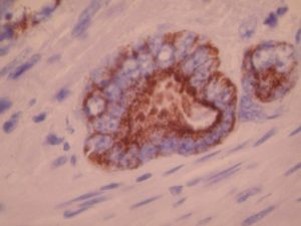p504S by IHC
p504S by IHC-12376 - Technical only, 12379 - Technical & interpretation
p504S by IHC
12376 - Technical only, 12379 - Technical & interpretation
LAB12376
LAB12379
LAB12379
AMACR
Racemase
Racemase
- All IHC stains will include a positive control tissue
- P504S can be used to identify prostatic adenocarcinoma and high-grade PIN
- A cocktail containing both P504S and P63 is available in our lab, to simultaneously evaluate for the outer basal cell layer of cells (the latter of which should be positive in benign glands and in high grade PIN
- Important exceptions: in our lab, P504S does stain seminal vesicles and ejaculatory ducts. Therefore, it is important to evaluate for pigment (which would be consistent with either ejaculatory ducts or seminal vesicles) before interpreting the P504S
- P504S is not specific for prostate, and therefore should only be used on prostate tissues. Other tissues that can stain for P504S include: Breast carcinoma, Cervical carcinoma, Gastric and colorectal carcinoma, Lymphoma, Lung carcinoma, Melanoma, Normal kidney and renal cell carcinoma, Normal liver and hepatocellular carcinoma and Urothelial carcinoma
Tissue
Submit a formalin-fixed, paraffin embedded tissue block
Formalin-fixed, paraffin embedded (FFPE) tissue block
FFPE tissue section mounted on a charged, unstained slide
Ambient (preferred)
- Unlabeled/mislabeled block
- Insufficient tissue
- Slides broken beyond repair
AHL - Immunohistochemistry
Mo - Fr
1 - 2 days
Immunohistochemical staining and microscopic examination
If requested, an interpretive report will be provided
Specifications
- P504S is a prostate cancer specific gene that encodes a protein involved in the beta-oxidation of branched chain fatty acids, and was recently discovered by using cDNA library subtraction and micro-arrays in malignant prostate tissues
- High expression of P504S has been found in prostatic adenocarcinomas (82-100% of cases) and high-grade PIN (64%)
- Atypical adenomatous hyperplasia has been reported as negative, focal positive, or diffusely positive for P604S
- P504S is usually not present (or is focal and weak) in benign prostatic tissues
- P504S is reported as negative in prostatic atrophy
- P504S staining is not specific for prostate (see below)
Staining pattern
- Strong granular cytoplasmic and apical staining, with circumferential staining of malignant glands
- In most studies, negative expression includes both negative and weak staining
References
- Jiang Z et al: P504S; a new molecular marker for the detection of prostate carcinoma. Am J Surg Pathol 25(11): 1397-1404, 2001.
- Yang XJ et al: Expression of alpha-methylacyl-CoA racemase (P504S) in atypical adenomatous hyperplasia of the prostate. Am J Surg Pathol 26(7); 921-925, 2002.
- Zhou M et al: Alpha-methlylacyl-CoA racemase; a novel tumor marker over-expressed in several human cancers and their precursor lesions. Am J Surg Pathol 26(7); 926-931, 2002.
- Jiang Z et al: P504S/alpha-methylacyl-coA racemase; a useful marker for diagnosis of small foci of prostatic carcinoma on needle biopsy. Am J Surg Pathol (26(9): 1169-1174,2002.
- Beach R et al: P504S immunohistochemical detection in 405 prostatic specimens including 376 18-gauge needle biopsies. Am J Surg Pathol 26(12):1588- 1596, 2002.
- Jiang Z et al Discovery and Clinical Application of a Novel Prostate Cancer Marker (P504S). Am J Clin Pathol 2004 122: 275-289.
88342 - 1st stain
88341 - each additional stain
88341 - each additional stain
07/19/2017
10/19/2018
01/21/2026
